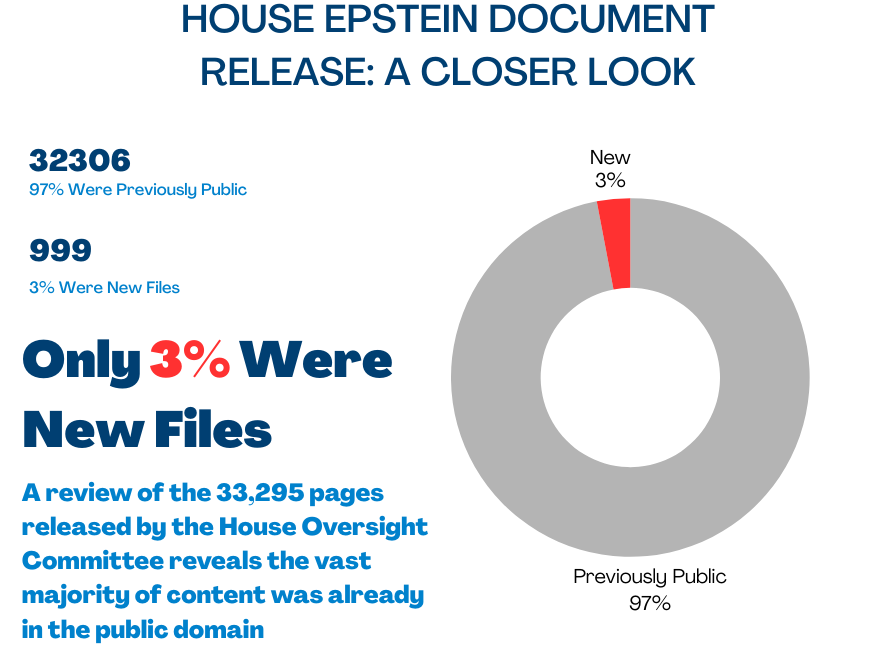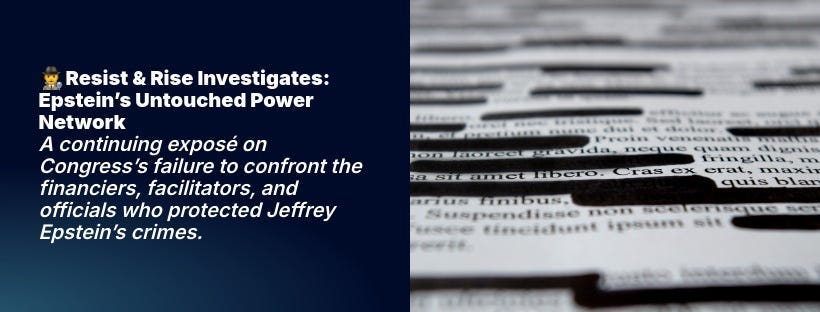Beyond the Document Dump: Grassroots Pressure and the Battle for Real Epstein Accountability
The House dropped 33,000 pages of “new” Epstein files, but with 97% of it already public, the release feels more like a cynical performance than a genuine act of transparency. Now, survivors, activists, and a furious public are demanding more than political theater and redacted PDFs.
In a move heralded as a major step toward transparency, the House Oversight Committee released a massive trove of over 33,000 pages of documents related to Jeffrey Epstein. But the initial excitement quickly soured into familiar outrage. The vast majority of the files were recycled public records, and the few new details were buried under heavy redactions. This "document dump" has been slammed by a rare bipartisan chorus of lawmakers and, most importantly, by the survivors of Epstein's abuse. They argue this is not justice; it's a continuation of the institutional obfuscation that allowed a predator to operate with impunity for decades. The battle for real accountability has just begun.
A Masterclass in Recycling: What Was Actually Released?
The document release was a masterclass in giving the appearance of transparency while offering little substance. While the sheer volume of pages seems impressive, the content was overwhelmingly familiar to anyone who has followed the case. It was less of a revelation and more of a repackaging.
Fact: The House Oversight Committee released 33,295 pages of records, but Democrats on the committee confirmed that 97% of the documents were already public.1
Fact: The scant new information primarily consisted of less than 1,000 pages of Customs and Border Protection flight logs from 2000–2014.2
Fact: The release included 13 hours of jail surveillance video from the night of Epstein’s death, which filled a previously missing minute but offered no new insight into his suicide.3
Fact: Despite promises and speculation, the documents contained “no client list” and no new evidence of high-profile complicity, with many files remaining heavily redacted.
Commentary: Releasing tens of thousands of pages of documents you know are already public isn't transparency; it's a political stunt designed to exhaust public attention. It’s the bureaucratic equivalent of drowning a single needle of truth in a haystack of recycled paper.
Bipartisan Disgust, Survivor Pain
In a deeply divided Washington, the Epstein case has forged a rare and angry consensus: the government's handling of this has been a failure. The frustration is shared across the aisle and is most profoundly felt by the survivors who continue to fight for their stories to be officially heard and acted upon.
Fact: House Oversight Chair James Comer (R-KY) bluntly admitted, “As far as I can see, there’s nothing new in the documents.”4
Fact: Ranking Member Robert Garcia (D-CA) called the release “a spectacle of already-public documents,” warning the public, “Don’t let this fool you.”5
Fact: On September 2, 2025, after sustained pressure from Rep. Ayanna Pressley and survivor advocates, the House Oversight Committee held a closed-door roundtable with survivors, who demanded a full public hearing.6
Fact: Following the document release, House Speaker Mike Johnson met with six Epstein survivors, acknowledging that “there were tears in the room” as they recounted their experiences.7
Commentary: When the leaders of both parties on an investigative committee agree that a major document release contains “nothing new” it's a stunning admission of failure. The tears of survivors in the halls of Congress are a gut-wrenching reminder of the human cost of this political gamesmanship. Their courage in confronting power stands in stark contrast to the cowardice of the institutions that failed them.
The Cover-Up Playbook
The latest document dump doesn't exist in a vacuum. It follows a clear pattern of obstruction and broken promises from the highest levels of government, a playbook of “secrecy, deception, and disdain for the law” that feels ripped from the pages of history.8
Fact: In July 2025, the Trump administration's Justice Department issued a memo stating it would release no more Epstein documents, abruptly reversing prior pledges of transparency.9
Fact: Attorney General Pam Bondi repeatedly claimed to possess a “client list” and “tens of thousands of videos,” assertions later contradicted by her own DOJ, which found no such evidence.10
Fact: House Speaker Mike Johnson has been accused by members of both parties of obstructing a full House vote on disclosure by sending the House into an early recess and attempting to contain the inquiry.11
Fact: In response, a bipartisan group led by Reps. Thomas Massie (R-KY) and Ro Khanna (D-CA) are forcing a vote on a bill that would compel the DOJ to release all files within 30 days.12
Commentary: From a Justice Department that suddenly clams up to a House Speaker who appears to be running out the clock, the actions of those in power look less like a search for truth and more like a coordinated effort to manage a political problem. The bipartisan rebellion to force a vote is a direct challenge to this establishment stonewalling.
The People vs. The Powerful: An Overwhelming Mandate for Truth
While Washington dithers and deflects, the American public is overwhelmingly united in its demand for answers. Polling data reveals a massive chasm between the public's desire for truth and the government's paltry offerings.
Fact: An Economist/YouGov poll found that 79% of Americans want all documents pertaining to Epstein to be released.13
Fact: A staggering 69% of Americans believe the government is actively hiding information about the case, a view shared across party lines.14
Fact: According to a CBS News poll, a minuscule 3% of the public is satisfied with the information the government has released so far.15
Fact: The case has captured the nation's attention, with a UMass-Amherst poll finding 96% of Americans are aware of it.16
Commentary: A 3% satisfaction rating isn't a policy disagreement; it's a catastrophic failure of public trust. These numbers represent a clear, unambiguous mandate from the American people: stop the games and release the files. The near-universal demand for transparency makes the government's continued secrecy all the more indefensible.
What It Means
The institutional failure in the Epstein case is not an isolated incident. It echoes historical scandals where secrecy was used to shield the powerful from embarrassment, not to protect national security. In the Pentagon Papers, the government lied for years about the Vietnam War, using classification to hide its failures. During the Iran-Contra affair, officials engaged in "pervasive secrecy, deception, and destruction of evidence" to circumvent the law.17
The Epstein saga is this generation's chapter in that same dark history. The slow, redacted, and recycled document releases are a modern form of the same institutional instinct to conceal, delay, and hope the public loses interest. It demonstrates that without relentless, sustained pressure from the public and a courageous press, the default setting of power is to protect itself.
What's Next
The fight is moving from performative committee releases to direct legislative action and grassroots pressure.
Legislative Showdown: Keep a close watch on the bipartisan discharge petition led by Reps. Massie and Khanna. If it gains enough signatures, it will force a floor vote on their bill to compel the DOJ to release all Epstein files, bypassing committee leadership.18
Survivor-Led Advocacy: Survivor groups like Speak Out, Act, Reclaim (SOAR) will continue their direct actions, including press conferences and meetings on Capitol Hill, to ensure their voices lead the call for justice.19
DOJ Pressure: The Justice Department has stated it will continue producing records, but the pace and completeness of those releases will depend entirely on the public and political pressure applied.20
Call to Action
Accountability will not be handed down from on high; it must be demanded from the ground up.
Contact your representative and demand they sign the discharge petition for the Massie-Khanna bill for full Epstein file disclosure. You can find your representative at house.gov/representatives/find-your-representative.
Follow and amplify the work of survivor-led advocacy groups who are on the front lines of this fight.
Stay engaged. The strategy of the powerful is to wait you out. Don't let them.
Previous Articles in this Series:
Reader Question
What would real accountability look like in the Epstein case—and how can public pressure be sustained to achieve it?
Methods & Verification
This report is based on open-source intelligence (OSINT), including public records, official congressional press releases, and cross-source corroboration from reputable media outlets. Open questions remain regarding the full extent of redactions in unreleased files and the timeline for further government disclosures.






